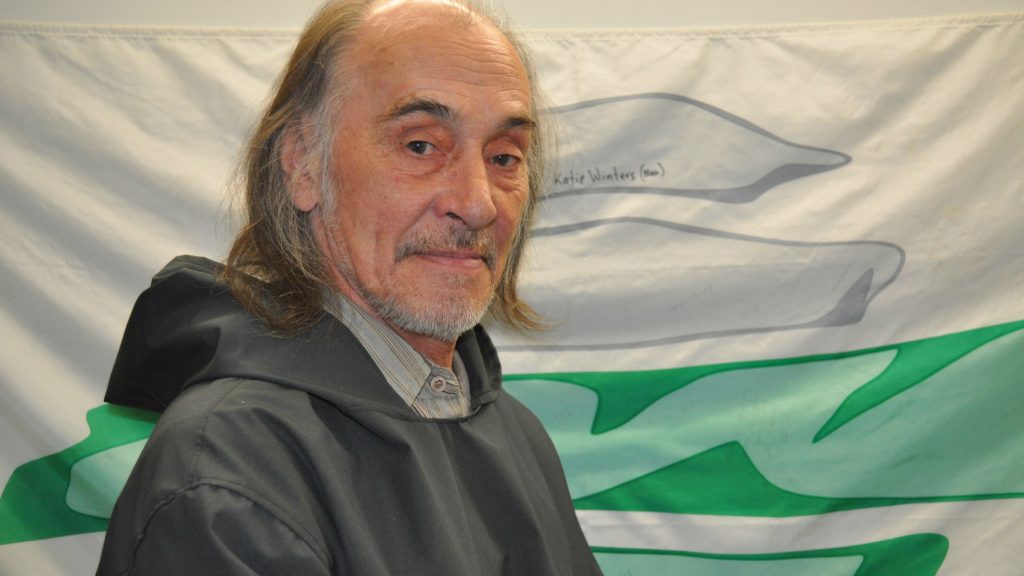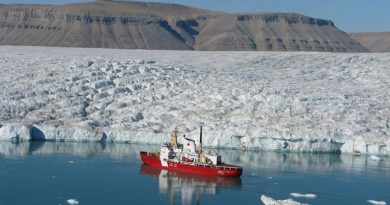Inuit in Atlantic Canada call for stop to George River caribou harvest

from the George River Caribou Herd,” says Tony Andersen, the Lands and Natural Resources minister in the Inuit region of the Canadian province of Newfoundland and Labrador. “We stand by that position.”
(Courtesy Nunatsiavut Government)
The government representing Inuit in the Atlantic Canadian province of Newfoundland and Labrador is calling for a hard stop to the harvesting of George River caribou.
“Caribou is a part of our cultural identity which has helped to sustain our people for thousands of years as a valuable source of food, clothing and tools,” said Tony Andersen, the minister of Lands and Natural Resources in the government of Nunatsiavut, the Inuit region of Newfoundland and Labrador.
“However, we have reached a point where the George River herd is struggling to survive and sacrifices have to be made if there is to be any hope of recovery,” Andersen said in a news release on Friday.
Mysterious decline
The fate of George River caribou herd has preoccupied regional and Indigenous governments in the region for years. Herd populations have been declining drastically but nobody understands exactly why.
In the most recent 2018 census, completed in July, biologists from Newfoundland and Labrador and the neighbouring province of Quebec, along with Indigenous representatives from both provinces, estimated current herd numbers at 5,500 animals.
That’s a 38 per cent decline since 2016 and a 99 per cent decline since 2001.
Andersen said the results show drastic action needs to be taken to protect the animals.
“Never did we think the decline would be as much as it was, and we can only attribute it to continued harvesting activities,” Andersen said.
Call for stop to subsistence hunting of threatened herd
In October, the Nunatsiavut government, a member of the Ungava Peninsula Caribou Aboriginal Round Table (UPCART), called for members to agree to stop harvesting from the herd, until the population reached sustainable levels.
UPCART is made up of Inuit from Nunavik, a region in northern Quebec, Nunatsiavut and the NunatuKavut Community Council in Newfoundland and Labrador; the Naskapi Nation of Kawawachikamach and the Grand Council of the Crees of Eeyou Istchee/Cree Nation Government (GCCEI/CNG) in Quebec; and the Innu Nation of Labrador and all the Innu communities from the Québec region.
This November, the Grand Council of the Crees (Eeyou Istchee) and Cree Nation Government passed a resolution banning harvesting from the George River herd, including by beneficiaries of the James Bay Northern Quebec Agreement, a 1975 Indigenous land claim settlement that, among other things, outlines the hunting and harvesting rights reserved for Indigenous peoples.
In December, Makivik Corporation, the organization representing the Inuit of northern Quebec, supported a resolution “voluntarily refraining from harvesting from the George River herd until the herd has recovered.”
Time running out
In his news release, Andersen said all Indigenous nations needed to get on board before it was too late.
“We are pleased to see other Indigenous nations support our position, and we call on others who have traditionally harvested George River caribou to follow suit,” he said.
“We remain committed to working with all members of UPCART, as well as the Innu Nation, to create a path forward that will hopefully see the herd recover to a point where we can all continue to maintain our cultural connections to this vital resource.”
In the meantime, Andersen said the provincial government needed to be more robust in its enforcement of the provincial harvesting moratorium on George River caribou.
“The Government of Newfoundland and Labrador put the ban in place, but is refusing to enforce it because it is more concerned about the political backlash it will receive than it is about protecting the future of the George River caribou,” Andersen said.
Nobody could be reached Newfoundland and Labrador’s department of Fisheries and Land Resources for comment before deadline.
Write to Eilís Quin at eilis.quinn(at)cbc.ca
Related stories from around the North:
Canada: First Nation bans Indigenous harvest of declining caribou herd in northern Quebec, CBC News
Finland: Gold mining in northern Finland hurts reindeer, says Natural Resources Institute, YLE News
Norway: Norwegian «slow TV» follows reindeer herd to the coast of the Barents Sea, The Independent Barents Observer
Russia: Russia plans fenced parks to confine reindeer herding in Arctic, The Independent Barents Observer
Sweden: Indigenous reindeer herders request emergency aid after drought, wildfires ravage Sweden, Eye on the Arctic
United States: Amid shrinking sea ice, hunters race to adapt in Alaska, Alaska Public Media



